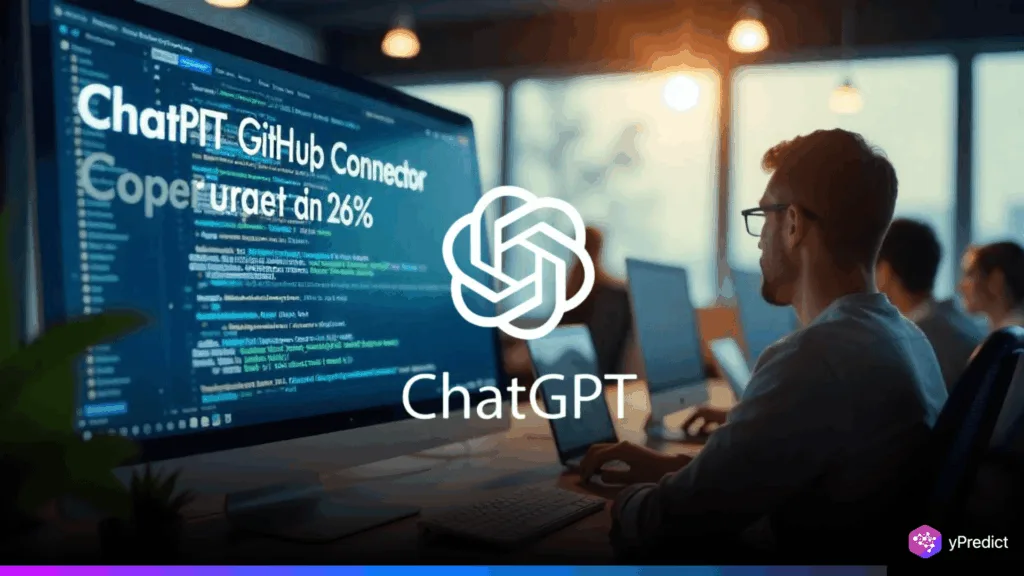
OpenAI has introduced its first connector for ChatGPT deep research, enabling direct integration with GitHub repositories. This beta version, the ChatGPT GitHub connector, enables users to deconstruct engineering documentation, comprehend APIs, and examine codebases using ChatGPT. For Plus, Pro, and Team subscribers, the feature is currently being rolled out; Enterprise and Edu access will follow shortly.
OpenAI’s move signals a broader strategy to enhance AI tools in professional developer workflows. Competitors like Anthropic are also expanding integrations into platforms such as Claude. The dedication of OpenAI to establishing programming as a core AI use case is evident in this introduction.
ChatGPT GitHub Connector Powers Smarter Code Analysis
Developers can ask insightful questions about codebases, get structured insights, and even turn product specifications into technical tasks. The ChatGPT GitHub connector can be used to carry out these tasks.
By highlighting dependencies, summarizing code structure, and providing real-world examples to illustrate API usage. This connector expands ChatGPT’s functionality and simplifies tasks that would otherwise require manual analysis.
In contrast to OpenAI’s previous plug-in framework, this connector exhibits a more targeted methodology. Users can only access content that they have been granted permission to view, in compliance with GitHub’s sharing permissions. This ensures the safe deployment of AI tools in corporate settings by optimizing advantages for technical teams utilizing shared code.
Is OpenAI Rewriting the Future of Coding?
The launch is a part of OpenAI’s ongoing effort to transition from open-source initiatives to full-fledged enterprise solutions. Today, the company focuses on customized commercial offerings like the ChatGPT GitHub connector. However, in 2016, it released Universe, an open-source platform for AI training. This tool is an example of OpenAI’s hybrid model, which strikes a balance between paid services and a few open-source innovations, such as its new terminal coding tool, Codex CLI.
On LinkedIn, users frequently request integration with internal, private sources, according to Nate Gonzalez, Head of Business Products at OpenAI. That demand is satisfied by the new connector. Through direct integration with developer workflows, ChatGPT can now analyze shared internal codebases in addition to public repositories.
In addition, the business recently garnered media attention for its rumored $3 billion acquisition of the AI-powered coding assistant Windsurf. OpenAI is establishing itself as a leader in future-ready AI tools with the addition of capabilities for models like O4-Mini and GPT-4.1 Nano.
AI Tools Compete to Lead Developer Workflows
The unveiling of the ChatGPT GitHub connector happens amid fierce competition among AI giants for dominance in developer ecosystems. The latest version of GitHub enables switching between OpenAI, Google, and Anthropic models. It responds to the increasing need for flexible, integrated AI development assistance.
Anthropic’s Claude 3.5 Sonnet recently outperformed OpenAI’s o1-mini in bug detection, revealing divergent model strengths. AI-native toolchains that interface with real-world platforms are becoming more popular in developer workflows. Companies are releasing agent frameworks like Anthropic’s Model Context Protocol and OpenAI’s Agents SDK to support this trend.
In the future, OpenAI is committed to creating scalable, secure, and intelligent integrations. As coding with AI advances from standalone bots to fully integrated AI assistants, the ChatGPT GitHub connector marks a significant milestone. As these tools advance, they have the potential to change how developers work, learn, and produce software on a large scale.
ChatGPT GitHub Connector Sets the Standard?
OpenAI has reaffirmed programming as a primary use case for AI with its most recent product. In addition to increasing productivity, the ChatGPT GitHub connector facilitates a deeper integration of AI tools into fundamental developer workflows. As OpenAI refines its models and broadens access across user tiers, the connector sets the stage for intelligent systems. These systems are poised to increasingly drive the next wave of software development.






